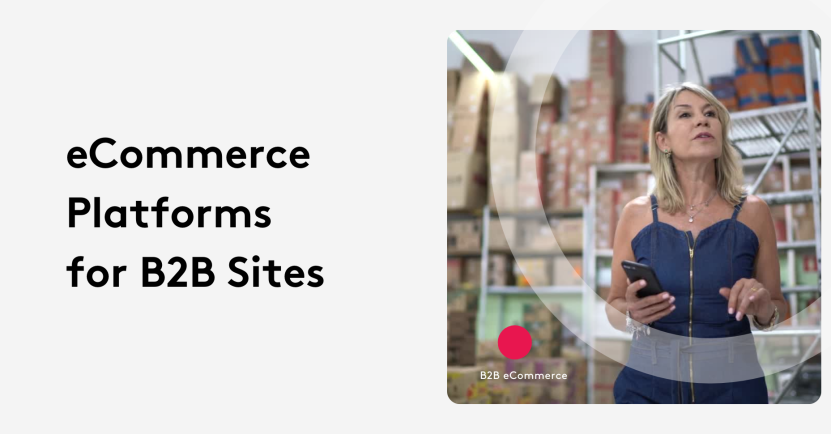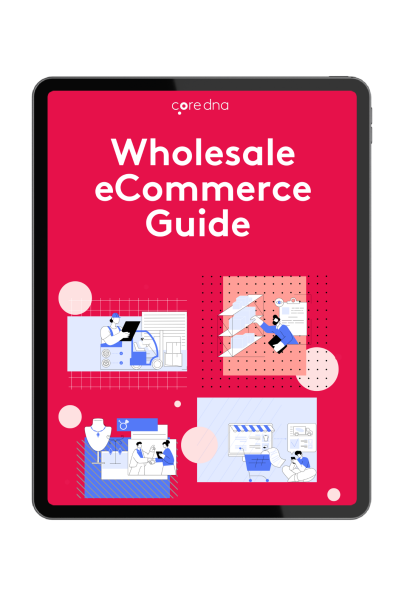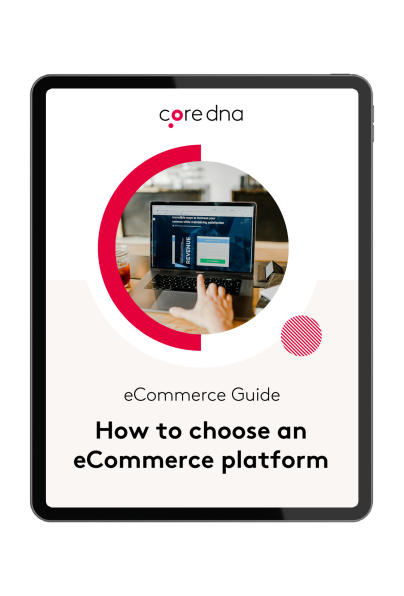How to Choose a B2B eCommerce Platform

B2B business are run differently than B2C ones, and for the longest times it was all relationship and phone based.
Today with B2B eCommerce platforms offering tailored solutions to B2B business, we see more and more businesses move towards a digital approach, expanding their reach and drive new sales beyond their network.
Yet, choosing the right B2B eCommerce platform is not as straightforward as choosing an out of the box B2C platform. Features such as bulk ordering, custom pricing, and intricate workflows are not offered in regular B2C eCommerce platforms that’s by looking into specialized b2b eCommerce platforms is essential.
With so many options available, choosing the right eCommerce platform that aligns perfectly with your business needs is not a walk in the park.
In this guide, we will lay out every aspect you should take into consideration when choosing an eCommerce platform and hope it will help you with the selection process for b2b eCommerce platform. We will go over practical insights to help you make the right choice.
Key takeaways
- B2B is not B2C: Your platform must support B2B-specific needs like bulk ordering, custom pricing, account hierarchies, and complex workflows—not just basic shopping cart features.
- Define your unique requirements early: Know your catalog size, customer types, sales process, and integration needs before comparing platforms to avoid costly misalignment.
- Prioritize integration and scalability: Choose an API-first platform that fits into your tech stack and can scale across multiple brands, regions, and teams.
- User experience matters—for both customers and internal teams: Look for platforms with self-service portals, intuitive search, mobile support, and easy content management.
- Choose a platform that’s a growth partner—not just software: The right vendor offers support, security, regular updates, and a flexible roadmap that grows with your business.
On this page:
Understand What Makes B2B eCommerce Different
If you're running a B2B business, you’ve probably seen how messy things get when your platform isn’t built for the way you actually work.
When it comes to bulk orders, account approvals, or pricing that changes by customer, most platforms don't have those out of the box that's why before you even start comparing platforms, ask yourself this: Can this platform match how we operate or are we going to have to change the way we work to fit the tech?
A good B2B ecommerce platform should be flexible from the start. It should handle your unique workflows, your customer hierarchies, your custom pricing rules without turning everything into a dev project.
These are some of the b2b ecommerce features we consider non negotiable:
- Bulk Orders & Tiered Pricing: B2B transactions often involve large quantities, negotiated rates, and dynamic pricing models based on contract terms or order volume.
- Account Hierarchies: This features will help control what user access what. The same platform should support different permissions for managers, retailers, approvers, and finance teams.
- Custom Catalogs & RFQs: b2b buyers usually expect personalized product catalogs and the ability to request custom quotes based on specific needs.
- Product Catalogs & Procurement Integration: Many B2B buyers rely on integrated procurement systems that need seamless support.
- Reordering & Order History: B2B customers value efficiency, features like saved carts, quick reordering, and easy access to past invoices make a big difference.
If your platform isn’t purpose-built for these workflows, your team will end up relying on patches, plugins, or manual processes that slow down operations and frustrate customers.
Define Your B2B eCommerce Business Requirements
Not all B2B eCommerce platforms are created equal—and what works for one business might fall flat for another. That’s why the first step in your selection process should be defining your specific requirements.
Take time to assess both your current operations and your future plans. A platform that meets your needs today but can’t scale with you tomorrow will only lead to frustration and another costly migration.
Here are a few critical areas to evaluate:
- Number of SKUs: Do you have a small, focused product line or a vast catalog with thousands of variations? Your platform needs to handle your inventory size without performance issues.
- Types of Customers: Are you selling to distributors, resellers, retailers, or directly to business buyers? Different customer types often need unique pricing models, catalogs, and ordering workflows.
- Multi-Brand or International Sales: If you manage multiple brands or sell across different regions, you’ll need support for localized content, currencies, tax rules, and even multi-site management from a single backend.
- Sales Model: Do you have a field sales team, in-house reps, or a hybrid approach? Your platform should support both self-service buying and sales-assisted processes like quoting and negotiation.
Once you’ve mapped your business needs, it’s time to bring in your stakeholders. This isn’t just a marketing or IT decision—it impacts the whole company. Get input from:
- Sales (for frontline buyer needs and quoting processes)
- IT (for integration and data security)
- Operations (for order fulfillment, inventory, and logistics)
- Finance (for pricing, tax rules, invoicing, and reporting)
The more aligned your internal team is from the start, the easier it will be to select a platform that supports long-term growth and day-to-day efficiency
Must-Have Features in a B2B eCommerce Platform
Choosing the right B2B eCommerce platform will help you streamlining operations and digitize your business for better ROI. Below are the most important features to look at when evaluating b2b eCommerce platfomrs.
1. Flexible Product Catalog and Pricing Rules
- Custom Catalogs: Ability to create tailored product catalogs for different customers or customer groups, ensuring relevant product visibility.
- Dynamic Pricing: Support for complex pricing structures, including volume discounts, tiered pricing, and customer-specific pricing agreements.
2. Customer-Specific Portals or Experiences
- Personalized Dashboards: Offer dedicated portals where customers can view their specific pricing, order history, and tailored product recommendations.
- Account Management: Facilitate multiple user roles within a customer’s organization, allowing for varied permissions and approval workflows.
3. Advanced Order Management and Quoting
- Quote Management: Enable customers to request quotes directly through the platform, streamlining negotiations and approvals.
- Bulk Ordering: Simplify large volume purchases with tools designed for bulk order entry and management.
- Reordering Capabilities: Allow customers to easily reorder previous purchases, enhancing convenience and loyalty.
4. Integration with ERP, CRM, PIM, and Inventory Systems
- Seamless Connectivity: Ensure the platform can integrate with existing Enterprise Resource Planning (ERP), Customer Relationship Management (CRM), Product Information Management (PIM), and inventory management systems for real-time data synchronization.
- API Support: Robust APIs to facilitate custom integrations and data exchanges between systems.
5. Scalability and Multi-Site Support
- Growth Accommodation: The platform should scale with your business, handling increased product ranges, customer bases, and transaction volumes without performance degradation.
- Multi-Site Management: Capability to manage multiple storefronts or brands from a single backend, streamlining operations for businesses with diverse portfolios.
6. Role-Based Access and Workflows
- User Permissions: Define roles and permissions to control access to sensitive information and functionalities, ensuring internal security and operational efficiency.
- Approval Workflows: Implement customizable workflows for order approvals, credit limits, and other critical processes.
7. B2B Payments, Invoicing, and Tax Compliance
- Flexible Payment Options: Support for various payment methods, including purchase orders, credit terms, and electronic funds transfer, catering to B2B purchasing norms.
- Invoicing Capabilities: Generate and manage invoices directly through the platform, with options for automated billing and reminders.
- Tax Compliance: Tools to calculate and apply appropriate taxes based on customer location and transaction details, ensuring compliance with regional tax regulations.
By prioritizing these features, you can select a B2B eCommerce platform that not only meets your current operational needs but also supports future growth and enhances the overall customer experience.
Prioritize Integration Capabilities
No matter how feature-rich a B2B eCommerce platform is, it won’t deliver full value unless it integrates seamlessly with the rest of your business systems. From ERPs and CRMs to inventory and finance tools, your platform needs to be part of a connected ecosystem—not a standalone silo.
Why API-First Architecture Matters
An API-first approach means the platform is built for connectivity from day one. It allows developers to hook into any part of the system and exchange data securely and reliably in real time.
Whether you’re syncing customer data from your CRM or pushing fulfillment updates from your warehouse management system, APIs ensure the flow of information is smooth and automated.
Seamless Integration with Your Tech Stack
Your business likely runs on a variety of tools—ERP, PIM, accounting software, support platforms, and more. A modern eCommerce platform should “speak the same language” as these tools without the need for workarounds or fragile third-party connectors.
Look for platforms with pre-built integrations or robust API and webhook support to reduce time to launch and simplify ongoing maintenance.
Avoid Data Silos and Redundant Workflows
When systems aren’t integrated, data gets trapped in silos, teams waste time on duplicate tasks, and mistakes multiply.
Centralizing your business logic and ensuring data flows between systems in real time can drastically improve efficiency, customer service, and reporting accuracy. Integration isn't just a technical requirement—it’s a key driver of operational success.
Evaluate User Experience for Buyers and Teams
A great B2B eCommerce platform doesn’t just handle complexity—it makes that complexity invisible to your users. Both your customers and internal teams should find the platform intuitive, efficient, and even enjoyable to use.
Intuitive Self-Service Portals for Customers
Today’s B2B buyers expect the same level of ease they get from B2C experiences. That means self-service portals where they can view personalized pricing, place orders, track shipments, and download invoices—without needing to call a rep. These features empower your customers and free up your team.
Streamlined Onboarding for Internal Teams
Ease of use isn’t just for buyers. Your sales, marketing, and operations teams need a backend that’s easy to learn and manage. Look for platforms that offer intuitive dashboards, role-based permissions, and low-code content tools so teams can do more without relying on developers.
Mobile Accessibility, Speed, and Personalization
Whether your buyers are in the office or on the road, your site needs to perform. That means:
- Mobile-optimized interfaces for phones and tablets
- Fast page load times to reduce bounce rates
- Personalized experiences based on account type, location, or past behavior
All of these contribute to better engagement and increased conversion.
Site Search, Saved Carts, and Easy Reordering
B2B customers don’t want to start from scratch every time they shop. Your platform should include:
- Powerful, predictive search to help buyers find exactly what they need
- Saved carts and wishlists for easy reorder or approval workflows
- One-click reorder options to simplify recurring purchases
These usability features might seem small, but they make a big impact—especially when your customers are ordering dozens of SKUs at once.
Support, Security, and Scalability
Choosing the right B2B eCommerce platform will set your business up for sustained growth and help you avoid costly replatforming. To make sure your are making the righr decision, it’s critical to assess how well a platform supports your long-term goals.
Vendor Support and Onboarding
Having a reliable and accessible team that can act as an extension of your business is key to success. Look for a platform that offers dedicated account management, implementation services, and responsive support channels.
Hosting, Security, and Compliance
Your b2b ecommerce platform should be reliable, secure and comply with any and all regulations your business is subject to. Key things to look for are:
- Enterprise-grade hosting with performance guarantees
- Security certifications like SOC2, ISO 27001, and regular penetration testing
- Compliance support for GDPR, CCPA, and other regulations
Scalable
As your business expands, your platform should grow with you. Whether you're launching new brands, entering new regions, or adding new product lines, your platform should support:
- Multi-site and multi-language capabilities
- Flexible catalog structures and pricing models
- Centralized management across all digital properties
Look for platforms that offer this kind of agility out of the box, not as a patchwork of plugins.
Regular Updates and Roadmap Visibility
Your b2b ecommerce platform needs to release regular updates, security patches, performance improvements, and new features.
Compare B2B eCommerce Platforms Side by Side
Ok, time to look at 4 of the main b2b ecommerce platforms in the market and how they compare.
1. Core dna
Core dna is a CMS and eCommerce platform with orchestration at its heart. It's designed to cater to complex B2B requirements with features like:
- Unified CMS and eCommerce: This means you get all your data in one platform enabling you to create advanced digital experiences
- Flexible Product Catalogs: Handle multiple catalogs, variants, and bundles efficiently and multi-store catalogs management.
- Advanced B2B Features: Support for custom pricing, quotes, and third-party payment options.
- Scalability: Accommodates growth across markets, brands, and product lines.
2. BigCommerce B2B Edition
BigCommerce's B2B Edition is a big player in the ecommerce space and recently added B2B capabilities. Their key features include:
- Custom Pricing and Catalogs: Create customer-specific pricing and catalogs to cater to different segments.
- Quick Order Functionality: Enable bulk ordering through CSV uploads or SKU entry.
- Account Management Tools: Manage customer accounts with configurable permissions and credit limits.
- Mobile Optimization: Ensure a responsive design for buyers on-the-go.
3. Adobe Commerce (Magento)
Adobe Commerce is one the big names in the ecommerce space. It's a robust platform suitable for businesses requiring extensive customization. Its B2B features encompass:
- Company Accounts: Manage multiple buyers from the same organization under a single account.
- Shared Catalogs: Offer tailored catalogs with custom pricing for specific customer groups.
- Negotiable Quotes: Facilitate price negotiations directly through the platform.
- Purchase Order Approvals: Implement workflows to adhere to clients' internal purchasing rules.
4. OroCommerce
OroCommerce is built specifically for B2B transactions, offering features like:
- Corporate Account Management: Mirror buyers' organizational structures with parent-child account hierarchies.
- Flexible Workflows: Customize workflows to match complex B2B processes.
- CRM Integration: Leverage built-in CRM tools for enhanced customer relationship management.
- Open-Source Flexibility: Access and modify source code to tailor the platform to specific needs.
Platform Comparison Table
Feature/Platform | Core dna | BigCommerce B2B Edition | Adobe Commerce (Magento) | OroCommerce |
Built-in B2B Tools | Fully integrated | Available via third-party apps | Requires customization | Comprehensive B2B features |
Content & Commerce Integration | Unified CMS and eCommerce | Requires external CMS | CMS capabilities with customization | Limited CMS functionalities |
Customization & Flexibility | High flexibility with built-in tools | Flexible with app integrations | Highly customizable | Highly customizable |
Scalability | Scales across markets and brands | Scalable with limitations | Enterprise-level scalability | Designed for complex B2B scalability |
Support & Onboarding | Dedicated support and onboarding | Standard support with enterprise options | Varies by implementation partner | Community and enterprise support |
Ideal For | Mid-market to enterprise B2B brands | SMBs to mid-market businesses | Large enterprises with customization needs | B2B-focused enterprises |
Final Checklist for Choosing the Right Platform
If you are in the process of deciding what would be the best B2B eCommerce platform for your business, these are the 5 most important point to always consider. Features will be the same across platform but the vision and scalability is what makes the difference.
Final Checklist for Choosing the Right B2B eCommerce Platform
- Scalability: Can the platform accommodate your business's growth across markets, brands, and product lines?
- B2B-Specific Workflows: Does the platform support complex B2B functionalities such as custom pricing, quoting, and account hierarchies?
- System Integration: Is seamless integration with your existing ERP, CRM, and other essential systems achievable?
- Customer Experience: Will the platform enhance the user experience with features like intuitive navigation, personalized content, and mobile responsiveness?
- Vendor Partnership: Is the platform provider committed to being a strategic partner, offering robust support, regular updates, and a clear product roadmap?
If you put these as you guiding non-negotiables, you can make an informed decision that aligns with your business objectives and sets the foundation for sustained success in the B2B eCommerce landscape.
Selecting the right B2B eCommerce platform is not merely about acquiring software; it's about choosing a partner that aligns with your business goals and supports your growth trajectory.
The ideal platform should offer scalability, robust B2B functionalities, seamless integrations, and an enhanced customer experience.
At Core dna, we understand the complexities involved in B2B eCommerce and have developed a unified platform that integrates content management and eCommerce capabilities. Our solution is designed to adapt to your unique business needs, providing the flexibility and support necessary for sustainable growth.
Frequently Asked Questions
1. Which e-commerce platform offers robust B2B functionalities, including customer-specific pricing and product visibility?
Platforms like Core dna, OroCommerce, and Adobe Commerce (Magento) are purpose-built or heavily equipped for B2B. They offer features like:
- Custom pricing per customer or segment
- Personalized product catalogs
- Tiered pricing and quoting workflows
Core dna stands out for offering all these features natively without relying on third-party plugins.
2. Is it advisable to build a custom B2B eCommerce solution from scratch, or use existing platforms?
Unless you have a very niche use case or deep in-house dev resources, using a proven B2B platform is faster, safer, and more cost-effective.
Existing platforms (like Core dna, BigCommerce B2B, OroCommerce) offer robust APIs for custom workflows without building from scratch.
3. What are the key differences between B2B and B2C eCommerce, and how do they impact platform selection?
Key differences include:
- B2B = larger orders, custom pricing, account hierarchies, and longer sales cycles
- B2C = simpler checkout, high volume, fast conversions
Your platform must support:
- Account-level controls
- Bulk ordering and reordering
- Advanced integrations (ERP, CRM)
Choose a platform that’s purpose-built for these complexities, not a retrofitted B2C solution.
4. How can I integrate a product configurator into a B2B eCommerce platform for custom orders?
Many platforms offer:
- Customizable front-ends via headless or API-first architecture
- Integration-ready workflows for embedding product configurators
Look for platforms like Core dna or Adobe Commerce that support custom modules and APIs to pull in configurator logic and pricing into the cart.
5. What are the challenges of implementing multi-vendor capabilities in a B2B eCommerce platform?
Challenges include:
- Complex order routing
- Varying inventory sources
- Managing different vendor rules for shipping, pricing, tax
Solutions:
Platforms like Core dna offer native support or integrations for multi-vendor B2B. Look for one with:
- Centralized vendor management
- Flexible shipping rules
- Clear reporting per vendor
6 Which platforms effectively support both B2B and B2C operations?
BigCommerce, Adobe Commerce, and Core dna can all support hybrid B2B/B2C models.
Look for:
- Multi-store or multi-site management
- Audience segmentation for pricing/catalogs
- Role-based access for teams
Core dna allows you to manage B2B and B2C websites from a single backend—ideal if you want one command center.
7. What are best practices for managing complex B2B pricing in an eCommerce platform?
- Use tiered pricing based on order volume or account type
- Implement customer-specific pricing contracts
- Offer real-time quote generation (RFQ)
- Use pricing engines that connect with your ERP
Platforms like Core dna include all of the above natively, so you’re not patching together pricing logic.
8. How can B2B platforms accommodate diverse payment methods, like net terms and deposits?
B2B platforms should support:
- Purchase Orders (POs)
- Net terms (e.g., Net 30/60/90)
- Deposits and partial payments
- Credit tracking and payment allocation
Core dna, Adobe Commerce, and OroCommerce support these options either natively or through accounting integrations (e.g., NetSuite, QuickBooks).
9. What should I consider when choosing a platform that can scale with my B2B business?
Look for:
- API-first architecture for flexibility
- Multi-site/multi-brand support
- Infrastructure scalability (auto-scaling, CDN, uptime SLAs)
- Modular design for adding features as you grow
Core dna is especially strong in this area—built to scale with growing B2B and franchise businesses with central management and native support for complexity.















